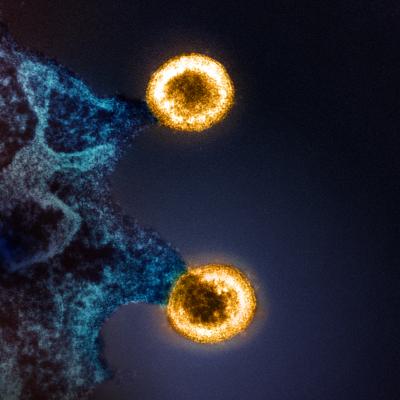Certain antibodies that pass through the placenta are associated with the improved survival of infants who acquire HIV through nursing, according to findings published in the journal, Open Forum Infectious Diseases. The Kenya-based study observed that preexisting antibodies that target a specific region of Env—a protein on HIV’s surface—were correlated with delayed HIV acquisition in infants exposed to the virus as well as a lower amount of virus circulating in the blood of infants who acquired HIV. Both of these conditions are known to help extend survival in infants with HIV.
Env has long been a target of potential HIV vaccines and monoclonal antibodies. It is present on HIV’s surface and widely understood to play a key role alerting immune cells to the presence of HIV in the body. In this study, antibodies that specifically targeted constant region 5 (C5) of Env were observed to have a positive correlation with infant survival, while there was not a consistent correlation observed between infant survival and antibody responses to other Env regions studied.
“Some areas of Env are easier for the immune system to ‘see’ than others, and antibodies to only certain parts of Env may be protective. The study found that the C5 region of Env may be a potential protective target for biomedical HIV interventions for infants,” said Dwight E. Yin, M.D., Ph.D., medical officer in the Division of AIDS at the National Institute of Allergy and Infectious Diseases, which funded the study.
The role of preexisting antibodies in infant outcomes can best be evaluated in cases where infants are HIV negative at birth but are later exposed to HIV through nursing, allowing antibodies to be measured around the time of HIV exposure. In this study, researchers used blood plasma samples that were taken from two cohorts of infants and birth parents. Both cohorts participated in research before effective antiretroviral therapy to prevent vertical HIV transmission was available in Kenya. Samples were analyzed for infants that were HIV-free at birth, had a nursing history of three or more months or nursed until the time of HIV acquisition, and for whom a plasma sample was available from the first week of life, when preexisting antibodies would be measurable. Key findings included the following:
- In the first cohort, 21 infants acquired HIV during the study while 51 did not. Of the 21 infants living with HIV (ILWH), 13 survived until age 2.
- In the second cohort, 15 of the 86 infants acquired HIV while 72 did not. Of the 15 ILWH, eight survived the 1 to 2-year follow-up period.
- C5-specific antibodies were detected in greater numbers within plasma samples of surviving infants; higher numbers of C5-specific antibodies were also associated with lower viral load set point and delayed HIV acquisition in both cohorts.
“These findings reinforce that not all babies exposed to HIV acquire the virus and of those who do, not all progress to death, even over an extended period of observation,” said Ruth Nduati, M.B.Ch.B., M. Med., M.P.H., a pediatrician in the Department of Paediatrics and Child Health at the University of Nairobi, a paper co-author and a lead investigator of a study cohort called the Nairobi Breastfeeding Trial. “We know that mothers provide passive immunity to their babies, and this is an important factor in protecting the infant from infections and, in the case of HIV, moderating the course of illness.”
The study sheds light on the possible role of preexisting antibodies in determining infant outcomes while highlighting the need for further studies to determine whether such antibodies can inform preventive or therapeutic strategies for HIV.
Reference: Yaffe, ZA et al. Passively Acquired Constant Region 5-Specific Antibodies Associated with Improved Survival in Infants Who Acquire Human Immunodeficiency Virus. Open Forum Infectious Diseases. DOI: 10.1093/ofid/ofad316 (2023).


